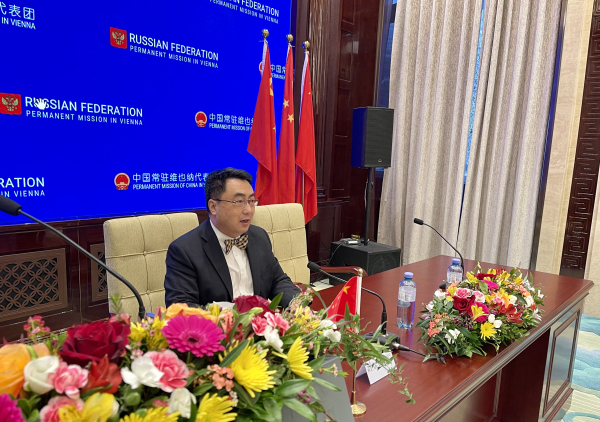Opening Remarks by H.E. Ambassador Wang Qun at the China-Russia Joint Press Conference

Ambassador Ulyanov,
Friends from the media,
I would like to first thank Ambassador Ulyanov, my good friend, for making himself available for today’s China-Russia joint press conference on the AUKUS and related non-proliferation issues. I would also like to thank all the friends from the press and media for coming to the Chinese Mission for the joint press conference despite the ongoing COVID-19 pandemic.
Given the wide interest and concern of the international community on AUKUS and related non-proliferation issues, Ambassador Ulyanov and I have decided to hold this joint press conference today upon conclusion of the Agency’s deliberation of the above issue.
The Board of the Agency has, for the first time, set up a new and full agenda item on the AUKUS and related non-proliferation issues, launching an inter-governmental process on this matter. This fully reflects the serious concerns of the Member States of the Board and shows that the matter goes beyond the existing mandate of the Agency’s Secretariat and shall be subject a formula to be worked out by the Member States of the Agency through the intergovernmental process. China believes that the inclusion of the new agenda item within the Board is a step in the right direction towards a proper resolution of the issue.
From what has transpired from the discussion this afternoon within the Board, the discussion was very comprehensive and in-depth, with many views expressed and suggestions put forward, including Amb. Ulyanov’s very substantive statement and the important views contained in the non-paper circulated Russian Federation.
Today’s discussion represents s a good start for the related on-going inter-governmental process, and has laid a solid basis for a mutually acceptable solution to be worked out by Member States on this issue.
The trilateral nuclear submarine cooperation under AUKUS not only bears on the integrity, effectiveness and authority of the NPT, but also affects the global strategic stability and post-war international security order, with issues covering a wide spectrum in political, legal, and technical aspects.
This issue cannot be dealt with by the three countries in private. Chinese State Councilor and Foreign Minister Wang Yi talked about the “three risks” and “five dangers” AUKUS will bring to non-proliferation, regional security, strategic stability.
While basing themselves on ideology, the United States, the United Kingdom and Australia have tried to set up a new military bloc by establishing AUKUS, exacerbating geo-political tensions.
At a time when the international community has all worked to promote solidarity in opposition of a new Cold War, the United States openly contradicted and departed from its recent political statement to the effect that “it will not seek a new Cold War” by ganging up for a small Anglo-Saxon "clique", with its geo-political and selfish interests overriding international solidarity. This is a typical Cold War mentality. This move by the three countries will spur regional countries to accelerate their development of military capabilities, and even seek to cross the nuclear threshold while increasing the risk of military conflicts.
Moreover, the United States has, on one hand, subjected some other countries to sanctions and suppression under the pretext of the latter’s development of nuclear technologies, but it has, on the other hand, flagrantly engaged in transfer of nuclear-weapon materials and nuclear-weapon technologies to certain non-nuclear state. This is a classic case in point of a double-standard. China wishes to register its firm opposition to such a practice by the United States.
At today’s deliberations within the Board, given the non-proliferation mandate of the IAEA, China mainly present its views looked on this issue from the perspective of non-proliferation by focusing on the problems may arise as a result of the AUKUS deal in the political, legal and technical aspects. China raised more than 50 questions for deliberations within the Board. In the meantime, China also shared with other Members its ideas and proposals as how to deepen the inter-governmental discussion so as to work out a proper solution by Member States on the basis of consensus.
It is the hope of China that the the United States, the United Kingdom and Australia will listen to the voice of the international community, abandon the obsolete "Cold War" mentality and narrow geo-political concepts by revoking the wrong decision.
And we hope the three countries will re-commit themselves to fulfilling international nuclear non-proliferation obligations under the NPT and work more to contribute to regional peace and stability. At the same time, the AUKUS-related issues are not what the Secretariat of the IAEA can resolve on its own.
The solution must be discussed by all IAEA Member States, based on the premise of wide participation by the international community. While formulating national position, China also made suggestions to the Board on how to effectively resolve the AUKUS and related issues in the future.
I will stop here, and I am looking forward to your questions in the Q&A session.